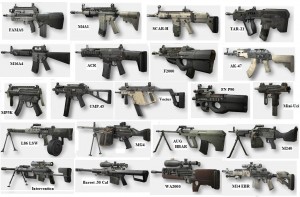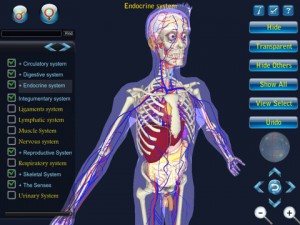If you were to ask anyone above the age of sixty if they’ve fired a gun, the chances are that they’ll only say ‘yes’ if they’ve served in the military. Otherwise they probably wouldn’t have a clue how to change a magazine or have the confidence to aim and fire one.

We’re gonna need guns, lots of guns.
These days, gaming teenagers could probably name at least ten different hand-held projectile weapons and tell you when they would use them and I’m sure they’d be proud to rattle off the list that they’ve learned from Battlefield or Call of Duty.
With this constant emulation of ‘real life’ I wonder if the games being played are actually an effective teaching tool.
The military certainly uses it to demonstrate strategies and tactics used on the battlefield as there’s only so much space to train on in the real world and a simulator can instantly cover a wider range of scenarios and terrains with relatively little effort.
In the past many mediums have been used to teach all manner of things to children and adults ranging from tying shoe laces to performing heart surgery and they normally move to the latest innovative media format in order to deliver their teachings.
It stands to reason that we would therefore expect the format being used, in its instructional nature, to be educational and inform those being taught. By the same method of thinking we can expect that the same attention is given to the games that are being played which is worrying when you think of their content.
Thankfully there are age ratings in place to prevent inappropriate material landing in to the grubby little mitts of those who simply aren’t mature enough to interpret and handle the adult information thrown at them, but we’ve been on about this before. The ratings system simply breaks down when Mummy and Daddy buy their ten year old the latest Call of Duty.
I wonder if there are better applications for the gaming technology that could actually pass life lessons on and teach morals in the process?
I’m not worried about probing the mind as in Jon Blows case but wondering if we’re ignoring a tool that could revolutionise the classroom and aid teachers in their delivery of the curriculum.
There are those applications which are designed to teach math and give an overview of the human body but they’re far too primitive in their current offerings.
 What if a pupil could expand a 3D view of the human body and learn about the effects of smoking whilst seeing accurate simulations of the damage it causes? Beats a video.
What if a pupil could expand a 3D view of the human body and learn about the effects of smoking whilst seeing accurate simulations of the damage it causes? Beats a video.
They could then explore the body from a microscopic point of view like in the film Inner Space and really get to know the human anatomy.
We’ve got the ability to send man to the stars so why are we still using computers to make cave paintings? We have the technology to do something amazing and advance the learnings of our children, so what are we waiting for?

